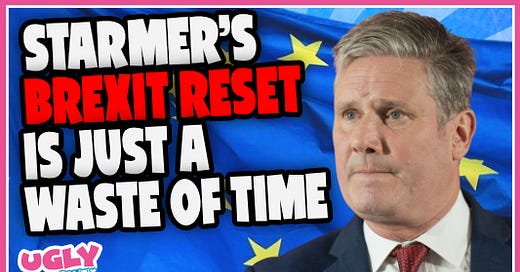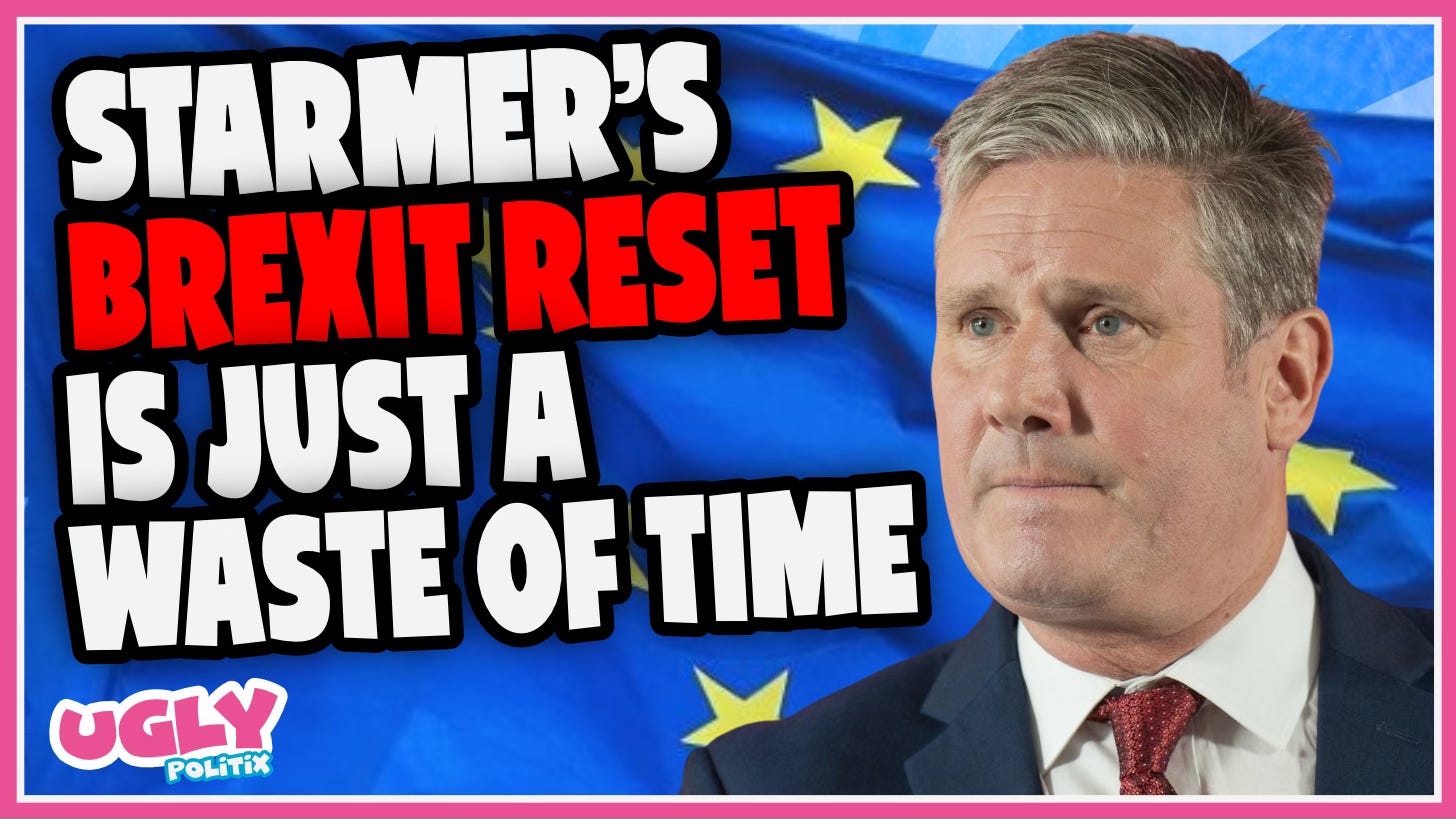Starmer's Brexit "Reset" is Not What the Public Wants
Perhaps a more functional democratic system would better reflect Britain's widespread Brexit regrets.
Six years ago, an impassioned Keir Starmer went off-script in his Labour party conference speech. The then-Shadow Brexit Secretary shocked and delighted the crowd by declaring that “no one is ruling out the option to Remain” in the European Union.
The Labour leadership at the time, reluctant to make such strong commitments, was livid. The pro-EU conference crowd conversely gave Starmer a standing ovation. It was the beginning of a pro-Remain crusade for Starmer within Labour. He’d go on to repeatedly assure members that he was “committed to a second referendum.”
But once he took the leadership, Starmer’s crusade retreated apace. In his view, the devastating 2019 election results for Labour meant that the public favoured Boris Johnson’s Brexit fundamentalism.
By the time of the 2020 Labour leadership contest, Starmer’s EU pitch had softened to “defend[ing] freedom of movement as we leave the EU.” In 2023, Starmer told the Financial Times that he “owes it to his children” to seek a rewrite of Boris Johnson’s “no-deal” Brexit Withdrawal Agreement at its scheduled review in 2025.
Fast forward to the 2024 General Election campaign, and Brexit had become a marginal part of the Labour Party agenda. The manifesto briefly mentioned “making Brexit work” (echoing the previous four Conservative leaders who had failed to do so), “deepening ties with European friends, neighbours and allies,” and “tearing down unnecessary barriers to trade.”
A return to freedom of movement, the customs union, and the single market were unequivocally ruled out. None of those things are likely “in my lifetime”, Sir Keir said in July.
For the sake of the Labour Party members who were excited by Starmer’s Brexit stance, and now the significant majority of the general public who say it was wrong to leave – it’s worth a look at what he’s currently pursuing in lieu of rejoining. Surely, as an avid proponent of economic growth, Starmer would at least push back against the more deleterious aspects of our no-deal Brexit.
Returning from a European tour in late August, Starmer described his vision for the EU as an “ambitious reset” of our relationship. According to the Prime Minister, for now that means bilateral trade agreements and joint action plans on immigration. These are direct agreements with France and Germany, highly limited in scope by the two nations’ EU membership.
It could also, according to Starmer, mean fighting for a few specific changes to our existing Withdrawal Agreement at its scheduled review in 2025. Starmer has said he wants a new veterinary agreement that could potentially reduce some border checks, an end to the severe impediments on musicians crossing the border, and standardisation of certain qualifications.
As Anand Menon, director of UK in a Changing Europe argues, negotiating these objectives will be both difficult to achieve and not particularly fruitful. It’s a “strange choice of objectives.”
Also originally included was a youth mobility scheme proposed by the European Commission. Starmer and Sunak both rejected it after discovering that it includes provisions letting a significant number of young Europeans come to the UK. The Commission is said to be revising that proposal – but the reluctance to allow in European students may well be a deal-breaker.
And that, essentially, is where we are – more or less back at square one. Young people (who largely voted against Brexit in the first place) have little hope in the near future of residing in Europe, even just for education purposes. We may, in a few years time, see a few trade barriers removed and musicians able to tour easily again if negotiations succeed – though how much damage will already be done at that point?
Starmer’s relationship with Brexit reveals an underlying truth: our disastrous withdrawal from the EU has become incontestable in Westminster. Even a Prime Minister who quite recently portrayed himself as a Remainer is now reduced to tinkering around the edges of profoundly broken agreements.
It’s understandable that the EU itself may not be inclined to trust Britain after what we pulled in 2016 – and after Boris Johnson’s behaviour during the negotiations. But perhaps if the majority of the country that wants to rejoin had a proper voice, they’d be inclined to trust us more.
Perhaps if we had an electoral system that doesn’t rely on the whims of a few swing constituencies, but rather reflected the genuine will of all people across the nation, we could show a unified will to properly repair our broken relationship with the European Union.
Perhaps if our system didn’t give a Prime Minister two thirds of the seats in Parliament with just one third of the vote, we’d have more means at our disposal to put pressure on leaders to advocate robustly for our interests.
Starmer’s meeting with the European Commission this past Sunday may have been framed as a glimmer of hope, but the details only cement what we already know. Both Labour and the Conservatives have now bought into the Eurosceptic narrative, despite the fact that the public increasingly rejects it.
For now, Keir Starmer’s indecision will continue to aggravate both Brexiteers and Rejoiners. His “reset” will be framed in the right-wing press as more Brussels tyranny, and the majority who want back in will be left disappointed at his feeble attempts to re-negotiate.
Until we get a proper democratic say in this country, we’ll be stuck in this political quagmire. Until our political system can truly represent the majority who want much stronger ties with the EU than the PM has been offering, we’ll stay right here, drifting further and further away from the partnership of nations we’ve spent decades building and influencing.






The red lines Starmer has are; no single market, no customs union and no freedom of movement. Exactly the same red lines that Theresa May, Boris Johnson, Liz Truss and Rishi Sunak had.
His "reset" seems to be an agreement to have meetings to decide what meetings might be possible in the future to discuss something about reducing paperwork by obeying EU rules.
The EU seem to want a youth mobility scheme that Starmer deems is too close to freedom of movement. The EU want the UK to implement the Withdrawal Agreement properly. There will be a discussion in 2026 on how the TCA is going. The UK will frame this as "negotiation" of some unspecified better deal. The EU will want to just discuss the technical processes of the Trade and Cooperation Agreement and the way it is working.
Nothing to see there really. The UK hasn't told the EU what it wants. No change from the Theresa May era of indecision.
When the UK was in the EU it always wanted to negotiate opt-outs. Now it is outside the EU it wants to negotiate opt-ins. In, out, shake it about for a couple of years. All unlikely to produce anything of substance.